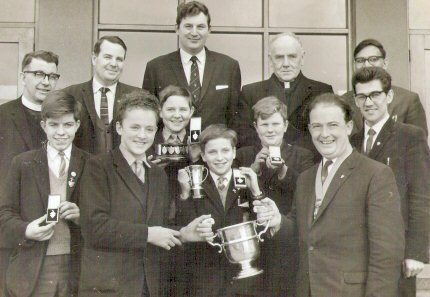Lieutenant Commander Butch O’Hare was a fighter pilot assigned to the aircraft carrier
One day his entire squadron was sent on a mission.
After he was airborne he looked at his fuel gauge and realized that someone had forgotten to top up his fuel tank. He would not have enough fuel to complete his mission and get back to his ship. His flight leader ordered him to return to the carrier. Reluctantly he dropped out of formation and headed back to the fleet. As he was returning to the mother-ship he saw something that turned his blood cold. A squadron of Japanese bombers was speeding its way toward the American fleet. The American fighters were gone on a sortie and the fleet was all but defenceless. He couldn’t reach his squadron and bring them back in time to save the fleet nor could he warn the fleet of the approaching danger. There was only one thing to do. He must somehow divert them away from the fleet.
Laying aside all thoughts of personal safety, he dived into the formation of Japanese planes. Wing-mounted fifty calibre machine guns blazed as he charged in, attacking one surprised enemy plane after another. Butch’s plane weaved in and out of the now broken formation and fired at as many planes as possible until all his ammunition was spent. Undaunted he continued the assault. He dived at the planes trying at least to clip off a wing or tail and render them unfit to fly. He was desperate to do anything he could to keep them from reaching the American fleet.
Finally the exasperated Japanese squadron took off in another direction. Deeply relieved Butch O’Hare and his tattered plane limped back to the carrier.
Upon arrival he reported in and related the events surrounding his early return. The film from the camera mounted on his plane told the tale. It showed the extent of Butch’s daring attempts to protect the fleet. He had destroyed five enemy bombers.
That action took place on February 20th 1942 and for it he became the Navy’s first ace of WWII and the first Naval Aviator to win the Congressional Medal of Honour.
One year later, at the age of 29, Butch was killed in aerial combat. His home town would not allow the memory of that heroic action to die.
Today O’Hare Airport in
Easy Eddie was very good at his job. In fact his skill at legal manipulation kept Capone out of jail for a long time. To show his appreciation Big Al paid him very well, so well that Easy Eddie and his family occupied a fenced-in mansion with live-in help and all the conveniences of the day. The estate was so large that it filled an entire
Eddie did have one soft spot however. He had a son that he loved dearly and he saw to it that he had the best of everything; clothes, cars and, above all, a good education. Nothing was withheld. Price was no object and despite his involvement with organized crime, Eddie tried to teach him right from wrong and to rise above his own sordid life. He wanted his son to be a better man than he was but there were two things that he could not pass on to his beloved son: a good name and good example. One day Easy Eddie reached a difficult decision.
Offering his son a good name was far more important than all the riches he could lavish on him. He had to rectify all the wrongs that he had done. He went to the authorities and told the truth about his boss, Al Capone. By doing so he hoped to clean up his tarnished name and offer his son some semblance of integrity. To do this he had to testify against the Mob and he knew that the cost would be great but, more than anything, he wanted to be an example to his son. He wanted to do his best to make restitution and hopefully, have a good name to leave his son.
Easy Eddie did testify against his former friends but within a year his life ended in a blaze of gunfire on a lonely
You may be wondering; what have these two stories got in common?
Well, you see, Butch O’Hare was Easy Eddie’s son.
